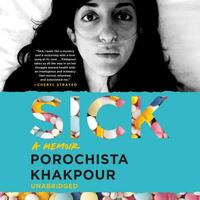You need to sign in or sign up before continuing.
Take a photo of a barcode or cover
This is also why we hear that chronic illness is a woman's burden. Women simply aren't allowed to be physically sick until they are mentally sick, too, and then it is by some miracle or accident that the two can be separated for proper diagnosis.
challenging
dark
informative
sad
I want to understand pain, that is why I decided to read this memoir.
Yes, Sick is about pain, or more likely, what is the source of pain. The author takes us into her process of figuring out what is wrong with her and its effect in her life. However, I feel that both doctors and editors left her alone, there are some odd shifts in time and structure that kept me wondering.
I appreciate though, the attention this brings to the challenges for women when it comes to mental health and the courage of the author of writing sick while sick.
Oh and no, this book did not help me understand pain, what I did understand is that no book ever will.
Yes, Sick is about pain, or more likely, what is the source of pain. The author takes us into her process of figuring out what is wrong with her and its effect in her life. However, I feel that both doctors and editors left her alone, there are some odd shifts in time and structure that kept me wondering.
I appreciate though, the attention this brings to the challenges for women when it comes to mental health and the courage of the author of writing sick while sick.
Oh and no, this book did not help me understand pain, what I did understand is that no book ever will.
As a nurse I am constantly trying to expand my limited view as a provider to include more experiences of what its like on the other side. This memoir has, within its first few chapters, already show me so much. Like, what its like for a child to be partially drugged and to watch a hazy film of providers acting on their body. Like the reality of being forced to choose whether to get in the ambulance to receive care, if it means releasing the dog that's been by your side into the woods. Like what it looks like when we don't believe patients, when we belittle and minimize, when we tell people we are to be trusted when there's nothing we truly know. I love Porochista's writing and am so thankful she wrote this book.
This is a tough book. A memoir of a Iranian American woman’s struggle with illness and eventual diagnosis with late stage Lyme disease. Well written. Just challenging.
This book was lovely and wrenching. It's hard to fathom a life of such pain, but also, beautiful triumph. It's a realistic story of chronic illness. No happy endings or comfort for the reader here - just the reality of living with late stage Lyme. I appreciated the author's truthfulness about resisting a proper diagnosis because I have done the same.
I wanted to like this book, as a fellow chronically ill woman looking for narratives to help me understand and accept my situation, but ultimately I found it very structurally chaotic, hard to follow, lacking in clear characterizations, self-indulgent, vague about the illness issues it purports to address, and (in one section) needlessly shaming of sex work and sex workers.
In checking out Porochista's social media, it turns out that the SW-shaming isn't a one-off incident. She's doxxed a sex worker, made unfounded legal threats, and even claimed to have done sex work herself even though in this book she makes it pretty clear that she's nauseated by the whole idea. I already disliked the book but this has made it seem even more distasteful and upsetting to me in retrospect. I wish the author all the best with her health struggles but shaming and outing sex workers is not acceptable, in your work or outside of it.
In checking out Porochista's social media, it turns out that the SW-shaming isn't a one-off incident. She's doxxed a sex worker, made unfounded legal threats, and even claimed to have done sex work herself even though in this book she makes it pretty clear that she's nauseated by the whole idea. I already disliked the book but this has made it seem even more distasteful and upsetting to me in retrospect. I wish the author all the best with her health struggles but shaming and outing sex workers is not acceptable, in your work or outside of it.
emotional
informative
reflective
slow-paced
This memoir offered a painful exploration of the toll of chronic and undiagnosed illness. Well written and raw, the author invites readers into the painful world of complex chronic illness and the impacts of sexism, ableism (particularly around mental illness), and access on diagnosis and treatment. This wasn’t an easy read because the author wrote a realistic and painstaking diagnosis and nonlinear treatment story reflective of the realities of chronic illness. Recommend for cultivating empathy and confronting ableist ideas related to chronic illness.
I loved this, though it was hard to read. A New Yorker article I read said the most remarkable thing about it is how non-defensive the author is, how she doesn’t try to prove anything re: her mental wellness or that none of her illness is her fault or in her head. She speculates about how trauma, mental illness, self-harming behaviors (like drugs and smoking) could contribute to her illness. She’s “difficult” and doesn’t try to not be. At the same time it’s clear her illnesses are very real physiologically and so much both explicitly and between the lines about the racism and sexism that cause doctors (as well as family and community) to not take her seriously or blame her for it. She writes that this book is not the book she sold - she was sick while writing it, and continues to be - there’s not redemption/recovery arc in finally being diagnosed. It’s personal and complex and about a lot more than illness. I get why some readers found it frustrating, but I didn’t need it to not be messy in the way that it was.




